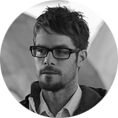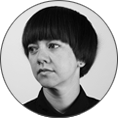ABOUT

October 27 - 29, 2016 | University of Michigan Taubman College | Ann Arbor, Michigan
Contact
About ACADIA
The Association for Computer Aided Design in Architecture is an international network of digital design researchers and professionals. We facilitate critical investigations into the role of computation in architecture, planning, and building science, encouraging innovation in design creativity, sustainability, and education. Please visit the main ACADIA website for more information.
Media Downloads
Emailable Logo:
Download zipped files
Printable Poster:
Download Horizontal poster: PDF or JPG
Download Vertical poster: PDF or JPG
ACADIA 2016 Theme
POSTHUMAN FRONTIERS: DATA, DESIGNERS AND COGNITIVE MACHINES will foster design work and research from the worlds of practice and academia that lie at the intersection between procedural design, designed environments and autonomous machines. More specifically, this conference will seek to explore recent work within the current trend in computational design to develop and apply quasi-cognitive machines; the integration of software, information, fabrication and sensing to generate mechanisms for interfacing with the physical realm. The conference will invite the submission of papers and projects that explore and interrogate these questions through interdisciplinary endeavors involving fields such as material science, biology, art, computer graphics, civil engineering, and human-computer interaction.
SPECIFIC TOPICS
Informational Hordes - Big Data
Assessment, judgment, and discovery of design data
Ownership / authorship in ideas, process, and means of production
- Simulation and Design Optimization
- Gaming in Design
- Design Decision-making
- Generative and Evolutionary/Genetic Design
- Building Information Modeling
- Interdisciplinary/Collaborative Design
- Responsive Urban And Landscape Systems
Cognitive Streams - Sensate Systems
Emergence of unintended consequences and entanglements
Tools, tool streams, and tool-building
- Multi-agent Systems
- Artificial Intelligence
- Internet of Things
- Digital Fabrication
- Craft in Design Computation
- Generative/Parametric Design
- Computer Vision
- Human-Computer Interaction and Design
- Robot-Human Collaboration
Semiautonomous Behavior - Embedded Responsiveness
Actor and agent-based networks as mechanisms for design
Reflexivity in human-computer engagement
- Biomimetics and Biological Design
- Programmable Materials
- Material Agency
- Form-finding
- Intelligent Environments
- Performance in Design
- Composite Forming Processes
Organizers
Conference Chairs

Geoffrey Thün
ACADIA 2016 Site Chair
Associate Dean, Taubman College
Founding Partner, RVTR (link)
Bio:
Geoffrey Thün holds a Masters of Urban Design from the University of Toronto, and a Bachelor of Architecture and Bachelor of Environmental Studies from the University of Waterloo. He is currently an Associate Professor at the Taubman College of Architecture and Urban Planning at the University of Michigan where he teaches design studios, courses in urban systems, site operations, and material systems.
Thün is also a founding partner of the research-based practice RVTR, which serves as a platform for exploration and experimentation in the agency of architecture and urban design within the context of dynamic ecological systems, infrastructures, materially and technologically mediated environments, and emerging social organizations. His academic research and creative practice has collected many awards and accolades which most recently includes a Journal of Architectural Education Best Design as Research Article (2013), The Architizer A+ Award Program’s Architecture + Sound Jury Award (2013), and an ACSA Faculty Design Award (2012).

Sean Ahlquist
ACADIA 2016 Technical Co-Chair
Assistant Professor, Taubman College
Member, Cluster in Computational Media and Interactive Systems (link)
Bio:
Sean Ahlquist holds a Master of Architecture from the Emergent Design and Technologies Program at the Architectural Association in London. As a part of the Cluster in Computational Media and Interactive Systems, his work connects Architecture with the fields of Material Science, Computer Science, Art & Design, and Music, with particular focus on material computation.
Ahlquist’s research formulates computational design frameworks where materiality functions as an a priori agent in the organization of architectural systems and their spatial tectonics. As an Assistant Professor at Taubman College of Architecture and Urban Planning at the University of Michigan, Ahlquist teaches at all levels, including ongoing involvement with the Master of Science in Material Systems program. Ahlquist continues to publish widely on the topic of computational design, including a reader entitled Computational Design Thinking, co-edited with Achim Menges, which collects and reflects up seminal texts formulating a systems and material based approach to architecture and design methodologies.

Matias del Campo
ACADIA 2016 Technical Co-Chair
Associate Professor, Taubman College
Co-founder, SPAN Architects (link)
Bio:
Chilean born and Austrian native, Matias del Campo graduated with distinction from the University of Applied Arts in Vienna, Austria. del Campo co-founded SPAN Architects in 2003 with Sandra Manninger and the globally-acting practice has become known for its sophisticated application of contemporary technologies in architectural production. The practice investigates the architectural qualities of sensorial and spatial conditions informed by Baroque geometries, romantic atmospheres, and biological systems, as they are combined with the manifold qualities of contemporary, algorithm-driven approaches.
As Associate Professor of Architecture at Taubman College of Architecture and Urban Planning at the University of Michigan, del Campo explores robotic fabrication processes as they relate to formal and tectonic architectural tendencies. del Campo’s work has garnered wide recognition, including first place competition entry for the Austrian Pavilion at the Shanghai World Expo in 2010, first place winning competition entry for the new Brancusi Miseum in Paris, France in 2008, and the exhibition of the work of SPAN at the Venice Architecture Biennale in 2012.

Kathy Velikov
ADACIA 2016 Technical Co-Chair
Associate Professor, Taubman College
Founding Partner, RVTR (link)
Bio:
Kathy Velikov holds a Master of Arts from the University of Toronto and a Bachelor of Architecture and Bachelor of Environmental Studies from the University of Waterloo. As an Associate Professor at Tuabman College of Architecture and Urban Planning at the University of Michigan, Velikov teaches design studio, ecology, technology and urbanism courses, and in the Master of Science in Material Systems program.
Velikov is a founding partner of RVTR, a practice and design-research platform exploring the agency of architecture and urban design within the context of dynamic ecological systems, infrastructures, energies, materially and technologically mediated environments and emerging social organizations. She is co-author of Infra Eco Logi Urbanism (Park Books, 2015), has been published in Leonardo, IJAC, JAE, New Geographies, eVolo, Volume, [bracket] Goes Soft, and MONU, and has work and writing in Hypernatural: Architecture’s New Relationship with Nature by Blaine Brownell and Marc Swackhamer, Performative Materials in Architecture by Rashida NG and Sneha Patel, and High Performance Homes by Franca Trubiano.

Wes McGee
ACADIA 2016 Workshop Co-Chair
Assistant Professor, Taubman College
Founding Partner and Senior Designer, Matter Design (link)
Bio:
Wes Mcgee is an Assistant Professor in Architecture and the Director of the FABLab at the University of Michigan Taubman College of Architecture and Urban Planning. His work revolves around the interrogation of machinic craft and material performance, with a research and teaching agenda focused on developing new connections between design, engineering, materials, and process as they relate to the built environment through the creation of customized software and hardware tools. With the goal of seamlessly integrating fabrication constraints with design intent, the work spans multiple realms, including algorithmic design, computational feedback of material properties, and the development of novel production processes which utilize industrial robots as bespoken machines of architectural production.
As a founding partner and senior designer in the studio Matter Design, his work spans a broad range of scales and materials, always dedicated to re-imagining the role of the designer in the digital era. In 2013 Matter Design was awarded the Architectural League Prize for Young Architects & Designers. Wes frequently presents work at national and international conferences on design and fabrication, and the work of Matter Design was recently featured in the book “PostDigital Artisans” by Jonathan Openshaw (Frame publishers), as well as “Next Progressives” in Architect Magazine. In 2014 he was the co-chair of the Robots in Architecture Conference, hosted at the University of Michigan.

Catie Newell
ACADIA 2016 Workshop Co-chair
Assistant Professor, Taubman College
Founding Principal, Alibi Studio (link)
Bio:
Catie Newell is an Assistant Professor of Architecture at the University of Michigan's Taubman College of Architecture and Urban Planning. Newell joined the faculty in 2009 as the Oberdick Fellow. She received her Masters of Architecture from Rice University and a Bachelor of Science in Architecture from Georgia Tech. Newell teaches design and fabrication courses and is heavily involved in the Masters of Science in Material Systems concentration.
Newell is also the founding principal of Alibi Studio. Newell's creative practice has been widely recognized for exploring design construction and materiality in relationship to the specificity of location and geography and cultural contingencies. Newell has won the SOM Prize for Design, Architecture and Urban Design, the Architectural League Prize for Young Architects and Designers, and the ArtPrize Best Use of Urban Space Juried Award. Alibi Studio has exhibited at the 2012 Architecture Venice Biennale and at the 2015 Lille3000 Triennial. In 2013 Newell was awarded the Cynthia Hazen Polsky and Leon Polsky Rome Prize in Architecture. She is a Fellow of the American Academy in Rome.

Sandra Manninger
ACADIA 2016 Project/Exhibition Chair
Lecturer, Taubman College
Principal, del Campo Manninger Architects (link)
Bio:
Sandra Manninger began her training at the High Technical Institute for Educating and Experimenting in Building and Construction in Graz, Austria where she graduated as an engineer. She later joined the Technical University in Vienna where she received training as an architect under the auspices of Bart Lootsma. Manninger is currently a lecturer at Taubman College of Architecture and Urban Planning at the University of Michigan and recipient of the Eliel Sarrinen Visiting Professorship.
Manninger is principle of del Campo Manninger Architects, which she founded with Matias del Campo. The practice focuses on the integration of advanced design and building techniques that folds, nature, culture, and technology into a design ecology. Manninger’s work is part of the permanent collection of the FRAC Centre Paris, the Luciano Benelton Collection, the MAK Museum of Applied Arts, and the Albertina in Vienna. She has been published in numerous magazines and books and presented papers at numerous conferences. She is lucky to travel the world to counsel and lecture at various institutions.
Session Chairs

Ellie Abrons
ACADIA 2016 Session Chair
Assistant Professor, Taubman College of Architecture and Urban Planning
Principal, EADO
Member, T+E+A+M
Bio:
Ellie Abrons is a designer, educator, and the principal of EADO. She is an Assistant Professor at the University of Michigan’s Taubman College of Architecture and Urban Planning, where she was the A. Alfred Taubman Fellow in 2009 – 2010. Her work focuses on material experimentation and reuse, digital fabrication, and explorations of formal allusion. Ellie received her M.Arch from the University of California Los Angeles, where she graduated with distinction, and her BA in art history and gender studies from New York University. Ellie is the recipient of a residency fellowship at the Akademie Schloss Solitude in Stuttgart, Germany and her work has been exhibited at the Venice Biennale, Storefront for Art and Architecture, A+D Gallery, and the Architectural Association. An exhibition of Ellie’s work, entitled Inside Things, was recently shown at SCI-Arc and she is a contributor (as part of T+E+A+M) to the U.S. Pavilion at the 2016 Venice Architecture Biennale.

Dana Cupkova
ACADIA 2016 Session Chair
Caste Assistant Professor, Track Chair MSSD, Carnegie Mellon University, School of Architecture
Bio:
Dana Cupkova is a founding partner and principal of Epiphyte Lab, an interdisciplinary design and research practice. She currently holds the Lucian & Rita Caste Assistant Professorship at Carnegie Mellon University's School of Architecture; and serves as a Track Chair for the school's MSSD program.
Dana’s design work studies the built environment at the intersection of ecology, computational processes, and systems analysis. In her research, she interrogates the relationship between design-space and ecology as it engages computational methods, thermodynamic processes, and experimentation with geometrically-driven performance logic.
Her current design-research in collaboration with manufacturing industry has been supported by the NYSCA Grant, the Center for Architecture Foundation Arnold W. Brunner Grant, the Cornell University Faculty Innovation Grant, Architectural League of NY, AIA Urban and Regional Solution Grant, the Pennsylvania Infrastructure Technology Alliance Grant, etc; presented and published internationally at venues and conferences such as ACADIA, IJAC, Design Modeling Symposium and others.

Neil Leach
ACADIA 2016 Session Chair
Architect, Curator, Writer
Bio:
Neil Leach teaches at the European Graduate School, Tongji University and Florida International University, and is a member of the Academia Europaea. He has been working on a NASA funded research project to develop robotic fabrication technologies to print structures on the Moon and Mars. He has published 27 books including Designing for a Digital World (Wiley, 2002), Digital Tectonics (Wiley, 2004), Digital Cities (Wiley, 2009), Machinic Processes (CABP, 2010), Fabricating the Future (Tongji UP, 2012), Scripting the Future (Tongji UP, 2012), Robotic Futures (Tongji UP, 2015) and Digital Factory: Advanced Computational Research (CABP, 2016).

Paul Nicholas
ACADIA 2016 Session Chair
Associate Professor, Centre for Information Technology and Architecture, Royal Academy of Fine Arts, School of Architecture
Bio:
Paul Nicholas holds a PhD in Architecture from RMIT University, Melbourne Australia. After co-founding the design firm Mesne Design Studio, and practicing with Arup Consulting Engineers from 2005 and AECOM/Edaw from 2009, Paul joined the Centre for Information Technology and Architecture (CITA), Copenhagen Denmark in 2011. Paul is currently head of the masters programme CITAstudio: Computation in Architecture. Paul’s particular interest is the development of innovative computational approaches that establish new bridges between design, structure, and materiality. His recent research explores sensor enabled robotic fabrication, multiscale modelling, and the idea that designed materials such as composites necessitate new relationships between material, representation, simulation and making.

Gilles Retsin
ACADIA 2016 Session Chair
Founder, Gilles Retsin Architecture
Teaching Fellow, UCL the Bartlett School of Architecture
Senior Lecturer, University of East London
Bio:
Gilles Retsin is the founder of Gilles Retsin Architecture, a young award-winning London based architecture and design practice, investigating new architectural models which engage with the potential of increased computational power and fabrication to generate buildings and objects with a previously unseen structure, detail and materiality. He graduated from the Architectural Association Design Research Lab in London. Alongside his practice, Gilles directs a Research Cluster at UCL - the Bartlett school of Architecture investigating robotic manufacturing and large-scale 3D printing, and he is a senior lecturer at UEL.

Jenny Sabin
ACADIA 2016 Session Chair
Arthur L. and Isabel B. Wiesenberger Assistant Professor, Director of Graduate Studies, Cornell University
Principal, Jenny Sabin Studio
Bio:
Jenny E. Sabin is an architectural designer whose work is at the forefront of a new direction for 21st century architectural practice — one that investigates the intersections of architecture and science, and applies insights and theories from biology and mathematics to the design of material structures. She is principal of the award-winning practice, Jenny Sabin Studio, an experimental architectural design studio based in Ithaca and Director of the Sabin Design Lab at Cornell AAP, a trans-disciplinary design research lab with specialization in computational design, data visualization and digital fabrication. Sabin is the Arthur L. and Isabel B. Wiesenberger Assistant Professor in the area of design and emerging technologies and Director of Graduate Studies in the Department of Architecture at Cornell University. Sabin’s collaborative research and design including bioinspired adaptive materials and 3D geometric assemblies has been funded substantially by the National Science Foundation with applied projects commissioned by diverse clients including Nike Inc., Autodesk, the Cooper Hewitt, the FRAC, the American Philosophical Society Museum, the Museum of Craft and Design, the Philadelphia Redevelopment Authority and the Exploratorium.

Jose Sanchez
ACADIA 2016 Session Chair
Assistant Profesor University of Southern California
Director of Plethora Project
Bio:
Jose Sanchez is an Architect / Programmer / Game Designer based in Los Angeles, California. He is the director of the Plethora Project, a research and learning project investing in the future of on-line open-source knowledge. He is also the creator of Block’hood, an award-winning city building video game exploring notions of crowdsourced urbanism named by the Guardian one of the most anticipated games of 2016.
He has taught and guest lectured in several renowned institutions across the world, including the Architectural Association in London, the University of Applied Arts (Angewandte) in Vienna, ETH Zurich, The Bartlett School of Architecture, University College London, and the Ecole Nationale Supérieure D'Architecture in Paris.
Today, he is an Assistant Professor at USC School of Architecture in Los Angeles. His research ‘Gamescapes’, explores generative interfaces in the form of video games, speculating in modes of intelligence augmentation, combinatorics and open systems as a design medium.

Kyle Steinfeld
ACADIA 2016 Session Chair
Assistant Professor of Architecture, University of California, Berkeley
Bio:
Kyle Steinfeld, Assistant Professor specializing in digital design technologies, is the author of the forthcoming "Geometric Computation: Foundations for Design", a text that seeks to demystify computational geometry for an audience of architecture students and design professionals, and is the creator of Decod.es, a platform-agnostic geometry library intended to promote computational literacy in creative design. He has been the recipient of a number of fellowships for research in design technology, recently serving as an IDEA fellow at Autodesk in 2014 and as a Hellman Fellow in 2012. His broad research interests include collaborative design technology platforms, design computation pedagogy, and bioclimatic design visualization. Professionally, he has worked with and consulted for a number of firms, including SOM, Acconci Studio, KPF, Howler/Yoon, and Diller+Scofidio. He teaches design studios, core courses in representation, and advanced seminars in digital modeling and visualization.

Dr. Philip Yuan
ACADIA 2016 Session Chair
Professor of Digital Design Research Center (DDRC), the College of Architecture and Urban Planning (CAUP), Tongji University
Founding partner of ARCHI-UNION and FAB-UNION
Council Member of Architecture Society of China (ASC) - Co-founder of Digital Architecture Design Association (DADA) in ASC
Bio:
Philip F. Yuan is dedicating in the combination of research, pedagogy and design experiments. The major research field is on the methodology of computational design and fabrication. The research consists of the fabrication of computational material research, robotic fabrication technology, the prototype of future digital factory, etc. Furthermore, the research also contains the Integration of Physical Wind Tunnel and CFD Simulation Technology as well as Acoustics and Theater Design. Philip F. Yuan has published books including A Tectonic Reality, Fabricating the Future, Scripting the Future, Theater Design, Robotic Futures, From Diagrammatic Thinking to Digital Fabrication and Digital Workshop in China. Philip F. Yuan has been honored the Youth Architects Prize of ASC, the Nomination Award in 2014 ARC SIA, Feng Jizhong Architectural Education Award, Public prize of Shenzhen Biennia, etc. And he has also been shortlisted for WA China Architectural Award of World Architecture and the 2014 Wienerberger Brick Award.